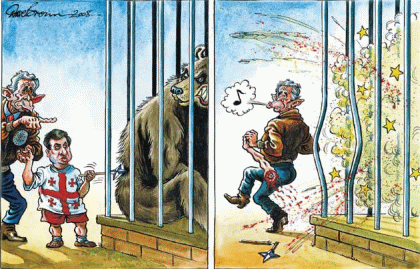
[The
Independent, U.K.]
Le Temps, Switzerland
Jitters in Russian
Media Over Georgia
"If the Kremlin is comfortable
in its [Army] boots, the Russian press is tormented the day after Russia
officially recognized the independence of the two separatist republics of
Georgia, Abkhazia and South Ossetia."
By Alexandre Billette
Translated By Elise Nussbaum
August 28, 2008
Switzerland
- Le Temps - Original Article (French)
MOSCOW: If the Kremlin is
comfortable in its [Army] boots, the Russian press is tormented the day after
Moscow officially recognized the independence of the two separatist republics
of Georgia, Abkhazia and South Ossetia.

Vedemosti of Russia
• A prime reason
for concern: the economic consequences of deteriorating relations with Moscow's
Western partners. "Guess what the new priorities of the country are,"
asks Vedemosti [A business daily]. "To
transform Moscow into an international business center, or modernize the army
with sophisticated weaponry? Are we headed for the country's modernization, or
its mobilization?" wonders the newspaper, pointing out that Moscow's stock
market had dropped over five percent since President Dmitri Medvedev's
announcement.

Vremia Novostiei of Russia
• Vremia Novostiei focuses on the international isolation that Russia is
risking: "The Kremlin has few illusions about what countries will join it
in recognizing the independence of the two republics." The daily recalled
that, "for the moment, only the leader of the Ukrainian Party of Regions
(pro-Russian  ), the
(pro-Kremlin) President of Chechnya, Ramzan Kadyrov, and the representative of Hamas in Moscow have
publicly expressed support for Moscow on this."
), the
(pro-Kremlin) President of Chechnya, Ramzan Kadyrov, and the representative of Hamas in Moscow have
publicly expressed support for Moscow on this."

Kommersant of Russia
• But above all,
Russian newspapers fear the domino effect of such a decision by the Kremlin.
"The Russian president is ready to confront the West," says a Kommersant
headline, which recalls that, "for the first time in its history, Russia
has chosen to support the principle of the right to self-determination of
peoples rather than territorial integrity. Even for 'friendly' entities such as
Serbian Krajina in Croatia [at the beginning of the
1990s, when Yugoslavia split apart  ], Russia has
never recognized the authorities of self-proclaimed republics. And it is
precisely on the basis of this principle that Moscow has always refused to
recognize the independence of Kosovo," the paper says.
], Russia has
never recognized the authorities of self-proclaimed republics. And it is
precisely on the basis of this principle that Moscow has always refused to
recognize the independence of Kosovo," the paper says.
Posted by WORLDMEETS.US
• Vremia Novostiei also comes back to this issue. By asserting that if
Kosovo could be independent, that means that the
self-proclaimed republics of the Caucasus could be as well. Moscow may have
created a precedent that set the entire region ablaze. The newspaper raises the
question of "a possible worsening of the conflict over
Nagorno-Karabakh" [a separatist region of Azerbaijan that is supported by
Armenia], and even an escalation of conflicts in the Caucasus, a vital region
for the transport of energy resources from the Caspian Sea.

RadioEchos of Moscow
• But now that Dmitri Medvedev has recognized the
independence of the two territories, "what do we do next?" asks
columnist Vikto Bountman of
Moscow's RadioEchos, on his blog. "We now
have two options: either we support this fictitious "independence" of
Tskhinvali and Soukhoumi
[the capitals of South Ossetia and Abkhazia], or we annex the two states into
the Russian Federation." The reporter judges that "The first option
is probably best on an economic level, because the "independence" in
these two entities allows the grey market to go on as before," an
ambiguous situation and of great benefit to smuggling of all kinds.

Rossiiskaďa Gazeta of Russia
• One must turn to publications favorable to the Kremlin
to see some optimism. The Rossiiskaďa Gazeta, as is its wont, gives space to experts or
deputies to analyze the consequences of Medvedev's
declaration [recognizing Ossetia's and Abkhazia's independence]. The West can't
really do much to Moscow, says Boris Makarenko of the
Center of Political Technology. "Western capitals are afraid of war and
they need Russia, especially in Afghanistan, where NATO is in a deplorable
situation and where Russia acts as a transit country for delivering
supplies."

Izvestia of Russia
• Finally, Izvestia also
believes that, "the negative consequences were foreseen." But
"neither threats nor isolation make sense, because it's hard to say who,
between the West and Russia, needs the other more" in a globalized
economy. The newspaper is concerned, however, about the lack of international
recognition of the two separatist republics - other than Russia. "Without
international support, the republics' independence will not be achieved,"
it concludes.
CLICK HERE FOR FRENCH
VERSION
[Posted by WORLDMEETS.US
September 6, 2:40am]